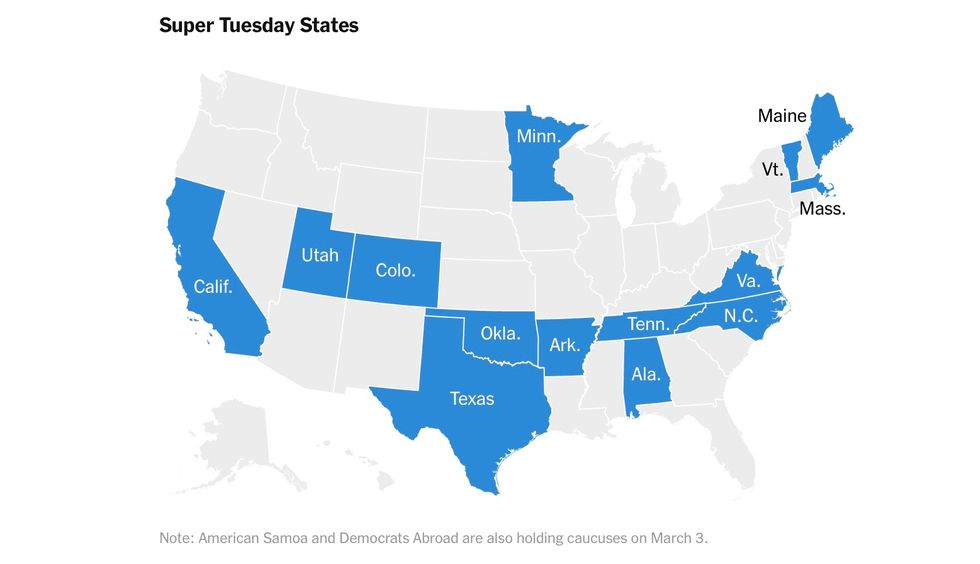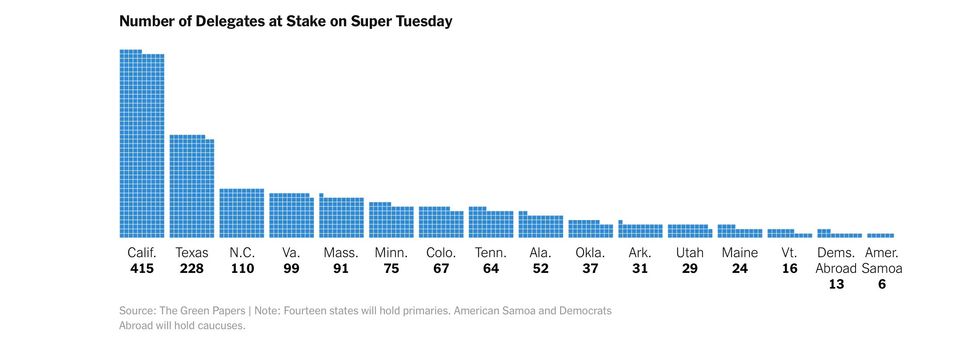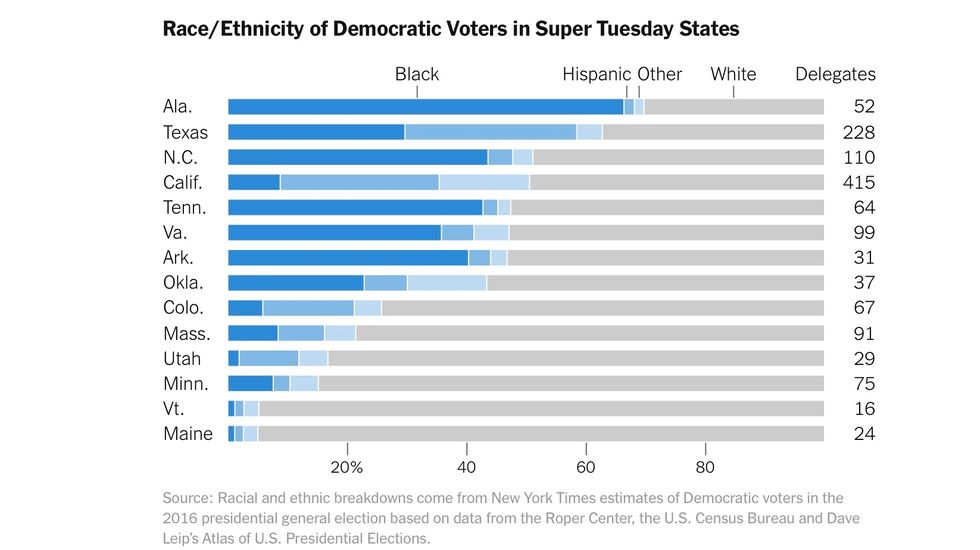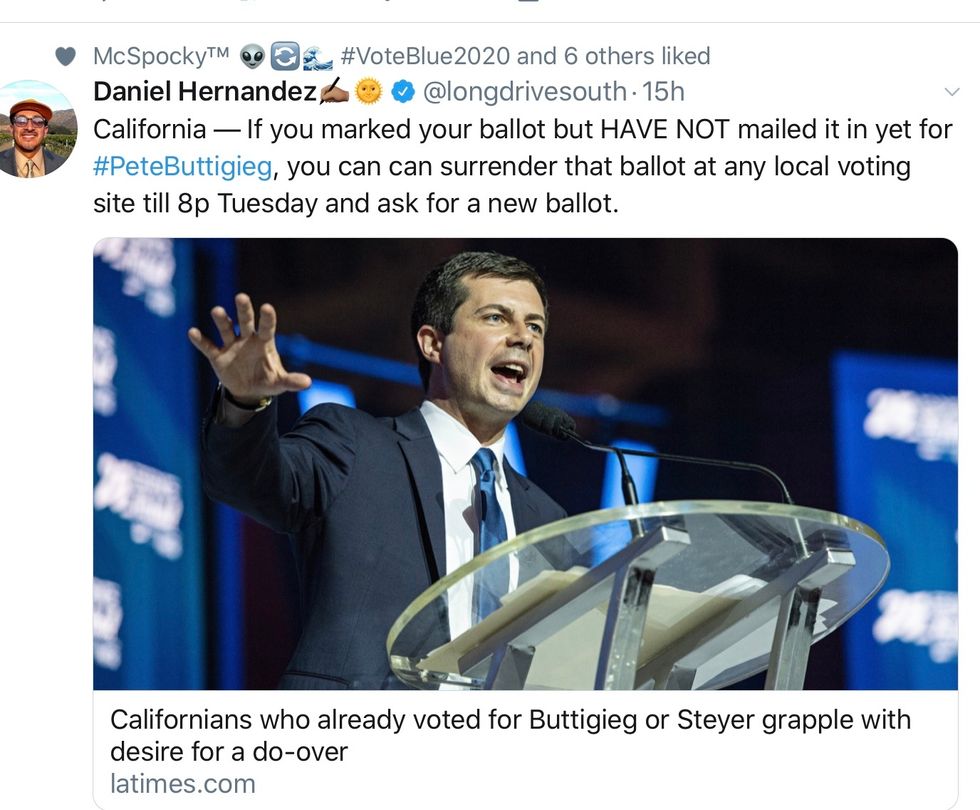This article is part of David Leonhardt's newsletter. You can sign up here to receive it each weekday.
If you're a Democrat who doesn't want Bernie Sanders to be the party's nominee, your choice is now clear: You should vote for Joe Biden.
That's the implication of Biden's resounding victory in South Carolina. And Pete Buttigieg — to his credit — acknowledged this reality by dropping out of the race last night.
I realize it was only about a week ago that Biden's campaign seemed grievously wounded, and he has still won only a single primary. So how has he so quickly become the only good alternative to Sanders?There are four main reasons:
1) Biden holds a clear lead in the combined popular vote after the four first contests, with about 30 percent. Sanders has 24 percent, and Buttigieg has 16 percent. Next come Elizabeth Warren (10 percent) and Amy Klobuchar (9 percent). Biden is first because he won South Carolina in a landslide, by an even larger margin than Sanders won Nevada, and because South Carolina is larger than either Iowa or New Hampshire. In the delegate count, Sanders holds a small lead over Biden, with no one else close.
2) Biden looks much more like a national candidate than any other moderate. As well as winning South Carolina, he finished second in Nevada. The only two states where Biden has trailed the other moderates — Iowa and New Hampshire — are overwhelmingly white states that don't resemble the rest of America.
3) Michael Bloomberg no longer looks to be as strong a candidate as he did before the debates. Bloomberg entered the race late, which makes it hard to judge his candidacy fully. But one of the penalties of entering the race late is that you forfeit some opportunities to win over voters. When Biden was looking his weakest — after New Hampshire — Bloomberg looked like he might be a better bet than Biden. Today, given Biden's current lead in the popular vote, it's very hard to make an argument that Bloomberg is the stronger candidate.
4) Moderate voters need to make a decision now. If they continue to split their votes among multiple candidates, they will hand the nomination to Sanders. This reality clearly shaped Buttigieg's decision to end his campaign — which was an impressive instance of a politician sublimating his own personal interests (amassing delegates and potentially being a convention kingmaker, in Buttigieg's case) to a larger principle.To be clear, I understand why many voters prefer Sanders over Biden. I see arguments in favor of each. But for Democrats who disagree with Sanders's agenda or who worry he is a weaker general election candidate, there is now only one real alternative: Biden.
For more …
Jonathan Bernstein, Bloomberg Opinion: "As for Michael Bloomberg … it's been true from the start and continues to be true that the most likely effect of his campaign is to split the mainstream liberal vote and make Sanders the nominee."
Nate Cohn, The Times's polling expert, sees Buttigieg's exit as good news for Biden: "Many stronger Buttigieg states [like Maine, Colorado and Utah, all of which vote Tuesday] were also states where Biden was in jeopardy of not hitting 15% [and thus winning no delegates]. Even if his support breaks evenly, good for Biden — and it might not be even. Elsewhere, Buttigieg support is concentrated in affluent areas, where it'll break Biden."
Megan McArdle: "I might be too pessimistic about Biden's chances. It all feels just too close to the emotional roller coaster we #NeverTrumpers rode back in 2016, when we spun elaborate fantasies about the field narrowing and a champion emerging to take down the Orange Menace."
Jonathan Chait: "Biden was not my first, or second, or third choice. He is endlessly exasperating. But he has a quality many of the media elites have failed to see. His meandering delivery — marred with a stutter that seems to have returned in his old age after he mastered it as a young man — nonetheless manages to convey a sincerity and a decency."
Perry Bacon Jr., FiveThirtyEight: Buttigieg "might genuinely think that Sanders would be a terrible nominee for the Democratic Party. But there is a potential upside for Buttigieg in making this decision too. At his age, Buttigieg has four decades to try to become president. In leaving the race now, he builds goodwill with Democratic Party officials broadly and Biden in particular."
New York Times, March 2, 2020
###
March 2, 2020
Voices4America Post Script. You may agree with David Leonhardt. You may not.
Either way, Tomorrow is Super Tuesday and big things will happen. 1,357 delegates in 14 states are at stake: 34% of the pledged delegates. For the first time, both California and Texas — the two biggest delegate prizes — will both be voting. The number of delegates needed to win the Democratic nomination is 1,991.



Only two candidates — Sanders and Biden — have any serious number of delegates, 58 and 50, respectively.
Sen. Elizabeth Warren and Sen. Amy Klobuchar have 8 and 7 delegates, respectively. Tom Steyer has 2 delegates from South Carolina. Former New York City Mayor Michael Bloomberg and Rep. Tulsi Gabbard each have none.
Of the 3 people who have dropped out, Tom Steyer, Mayor Pete and Senator Klobuchar, Senator Klobuchar is asking her supporters to join Joe Biden. Mayor Pete is expected to do the same. There is no information about Tom Steyer. #AmyToBiden #PeteToBiden
Here is one additional pice of news, worth passing on to Californians! If you haven't mailed your ballot, but completed it, you can get a New ballot tomorrow! True of voters for Steyer or Klobuchar too

Finally- a candidate needs 15% of the votes to share in a state's delegates.
Much to think about. The polls on https://www.realclearpolitics.com/epolls/latest_polls/ may stir your thoughts.
Regardless. Vote! Get out the Vote! #Blue2020

